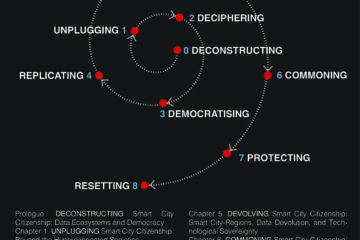
Review of Alt-Finance: How the City of London Bought Democracy by Marlène Benquet and Théo Bourgeron (Pluto Press, 2022)
For years academic literature and broader public debates have largely framed the Brexit referendum as a ‘popular revolt against the elites’. While some emphasised the role of economic factors and others boiled it down to anti-immigration attitudes, most accounts seem to converge around this bottom-up perspective that ordinary people disillusioned with the elites have driven the UK out of the EU. Conversely, apart from a few dissenting voices, the idea that economic elites have been mostly opposed to Brexit has been the prevailing view in the literature. Challenging the over-emphasis on the voting process, Marlène Benquet (University of Paris Dauphine) and Théo Bourgeron (University of Edinburgh) invite us to look more closely at the role played by the economic interests …

Review of Defekte Visionen. Eine Intervention zur Zukunft der Europäischen Union (Broken Visions. An Intervention on the Future of the European Union) by Alexander Thiele
What does the future of the European Union (EU) look like? Walking along the Rue de la Loi in the European Quarter in Brussels, the white and blue mural stating “The Future is Europe” by graffiti artist NovaDead sends a clear message. The bird in the right-hand corner stands for freedom and peace (referring to the values in Art. 2 of the Treaty on EU), the blue and yellow colours refer to the European flag, and the leaves recall the “green jungle” (a small forest of philodendrons) at the European Parliament in Strasbourg, which could also reflect the complex governance structure of the EU. But beyond this artistic and symbolic vision, what might the future of the EU look like …

Review of the Routledge Handbook of Proxy Wars (with two DPIR contributions)
DPhil candidate Giuseppe Spatafora summarises the key findings of the recently published Routledge Handbook of Proxy Wars, which aims to present the various facets of the phenomenon. The Handbook contains two contributions by DPIR scholars: one by Spatafora himself on the extent to which the Spanish Civil War presents proxy war characteristics, and one by Dr. Vanessa Meier on quantitative approaches to the study of proxy wars. The phenomenon of proxy wars has existed for centuries, well before what is commonly perceived as its heyday—the Cold War. Albeit more modern, the study of proxy wars is not in its infancy either. The Routledge Handbook of Proxy Wars (2023), edited by Assaf Moghadam, Vladimir Rauta, and Michel Wyss, aims to illustrate …

Review of Sehenden Auges: Mut zum Strategischen Kurswechsel (With Eyes Wide Open: The Courage for a Strategic Course Change) by Dr. Stefanie Babst
Just over a year after Russia’s invasion of Ukraine in February 2022, Dr. Stefanie Babst, who has held several senior positions at NATO, including heading its Strategic Foresight Team from 2012 to 2020, has published her latest book, Sehenden Auges: Mut zum Strategischen Kurswechsel (With Eyes Wide Open: The Courage for a Strategic Course Change). The book is an important call for critical reflection and course correction among NATO partners and a plea for the West to continue to support Ukraine, not least in its own interests. The first part of the book contextualises Russia’s war on Ukraine. The author explains Putin’s rise to power, the workings of his power apparatus, and Moscow’s strategic objectives. Babst provides the reader with …

Jihad in the City: Militant Islamism and Contentious Politics in Tripoli- Author’s Q&A
We interviewed Raphaël Lefèvre about his new book Jihad in the City: Militant Islamism and Contentious Politics in Tripoli, available now. OxPol: What motivated you write your book? Raphaël Lefèvre: I wanted to shed light on a little-known historical event with large contemporary echo: the creation by a militant Islamist movement of an “Islamic Emirate” on the city of Tripoli, Lebanon in 1982-1985. This movement has modern parallels with the “Islamic Caliphate” created by ISIS in parts of Iraq and Syria after 2014 and with similar attempts by Al-Qaeda to create “Islamic Emirates” on the territories it has sporadically controlled recently, from Southern Yemen and Northern Mali to Northern Syria. I am not suggesting that the 1982-1985 “Islamic Emirate” in Tripoli …

Smart City Citizenship: A Techno-Political Review (of Cities and Nations)
COVID-19 has hit European citizens dramatically, not only creating a general risk-driven environment with a wide array of economic vulnerabilities but also exposing them to pervasive digital risks, such as biosurveillance, misinformation, and e-democracy algorithmic threats. Over the course of the pandemic, a debate has emerged about the appropriate techno-political response when governments use disease surveillance technologies to tackle the spread of COVID-19. Citizens have pointed out the dichotomy between state-Leviathan cybercontrol and civil liberties. Moreover, the giant technological flagship firms of surveillance capitalism, such as Google, Amazon, and Facebook, have already assumed many functions previously associated with the nation-state, from cartography to the disease surveillance of citizens. But particularly, amidst the AI-driven algorithmic disruption and surveillance capitalism, Smart City Citizenship sheds light on the way citizens …

Borderland Battles: Violence, Crime and Governance at the Edges of Colombia’s War
Anette Idler summarizes some of the findings from her new book Borderland Battles, which reveals how violent non-state groups compete for territorial control, co-operate in illicit cross-border activities and replace the state in exerting governance functions in borderlands. Borderlands are like a magnifying glass on some of the most entrenched security challenges of the world. In unstable regions, border areas attract violent non-state groups ranging from rebels and paramilitaries to criminal organisations who exploit their neglect by central governments. These groups compete for territorial control, cooperate in illicit cross-border activities, and substitute for the governance functions usually associated with the state. Studying the Colombian borderlands where armed conflict and organised crime converge demonstrates that the gap between state-centric views on …

General election 2017: votes from anywhere
Some six months before Theresa May called a surprise general election, The Road to Somewhere was published. In it, David Goodhart argues that the old political divide, between left-wingers and right-wingers, has been superseded. The electorate, Goodhart claims, is now better divided between “anywheres” and “somewheres”. Peter Wiggins looks at the Goodhart argument in the context of the 2017 general election. Of “Anywheres”, “Somewheres” and “Inbetweeners” According to The Road to Somewhere, roughly 25% of the population are “anywheres” – they are mobile, metropolitan, liberal, tolerant, at home wherever they may be, and wary of group attachment. These voters are likely to be highly educated, and they tend to approve of “mass immigration,” subscribing, as Goodhart puts it, to “progressive …









